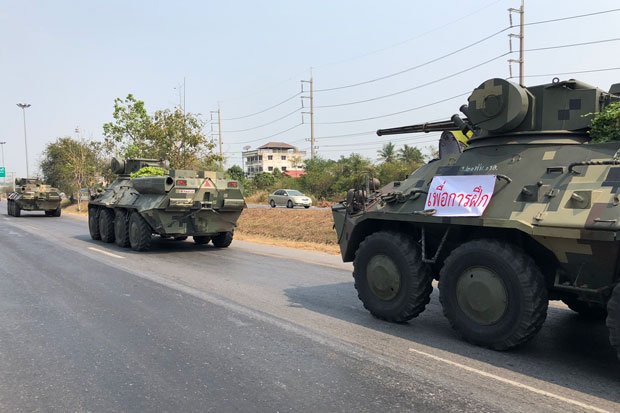The government has rejected calls for Prime Minister Prayut Chan-o-cha to use his special power under Section 44 to cut through red tape and obstructions in the investigation into the Rolls-Royce bribery scandal.
Government spokesman Sansern Kaewkamnerd said Gen Prayut was aware of public concern but the government felt it was more appropriate for the existing investigations to run their course.
Lt Gen Sansern said the necessary laws are in place and there are public independent agencies responsible for initiating probes into the scandal such as the National Anti-Corruption Commission (NACC) and the Office of the Auditor General.
Calls for Gen Prayut to invoke Section 44 have grown after it was revealed the 20-year statute of limitations had expired for the bribery cases that took place during the first two periods of the scandal.
Lt Gen Sansern said Section 44 would be used only when necessary, such as when there were legal obstacles or when further delays would cause tremendous damage to the public.
He warned there were groups who might try to politicise the exercising of Section 44 and use it as a reason to reject any findings in the investigation.
"The prime minister is pleased that the public has become more aware of corruption and wants to see action taken against the wrongdoers. But the authorities concerned have to follow procedures thoroughly, and this may take time," he said.
The NACC has set up a fact-finding panel to look into the bribery scandal. It is waiting for more information from the UK's Serious Fraud Office (SFO) before taking further action.
The scandal involves the purchase by Thai Airways International of Rolls-Royce aircraft engines.
The British company claimed it paid off "agents of the state of Thailand and employees of Thai Airways" when it negotiated a series of deals, according to a statement prepared for a British court.
The bribery occurred over three periods. One concerned the period between June 1, 1991, and June 30, 1992. Rolls-Royce agreed to pay US$18.8 million (660 million baht).
The second period was between March 1, 1992, and March 31, 1997, when Rolls-Royce agreed to pay $10.38 million to intermediaries.
The third period was between April 1, 2004, and Feb 28, 2005. Rolls-Royce agreed to pay almost $7.2 million to intermediaries.
A source in the NACC said the agency expects fact gathering to be completed soon because the SFO has acknowledged the NACC's status as the country's main agency responsible for handling the bribery cases.
However, the source noted that the information circulated by the media cannot be used in the investigation because it is secondary and the NACC needs it to be official.
The NACC's probe is likely to determine if money laundering is involved, the source said, adding that officials will have to gather details and question witnesses even though it obtains the information from the SFO.
The anti-graft agency has appointed three members to take charge of the inquiry: Supa Piyajitti, Surasak Khiriwichian and Pol Gen Sathapon Laothong.
Meanwhile, Lt-Gen Sansern also called on critics not to politicise the plummeting of the country's corruption ranking in efforts to discredit the government.
He said this could only hurt the country's image at a time when the government is working hard to combat corruption.
He said Gen Prayut was not worried about the ranking drop, but was not ignoring it and had asked officials to look into the areas where the country was performing poorly.
In Transparency International's 2016 assessment, Thailand's score dropped from 38 points out of 100 to 35, and its ranking plummeted from 76 to 101 out of 176 countries.
Lt Gen Sansern said the Transparency International assessment contradicted recent findings by the University of the Thai Chamber of Commerce.
A university survey showed that the corruption situation index (CSI) at the end of 2016 had indicated a big improvement over the last six years.



